Leadership and Management Concepts in Tesco: A Detailed Report
VerifiedAdded on 2023/01/10
|6
|1582
|69
Report
AI Summary
This report provides a comprehensive analysis of leadership and management concepts within the context of Tesco, a leading retail brand. It explores the distinct roles of leaders and managers, emphasizing their importance in driving innovation, employee training, and overall company performance. The report delves into the application of management theories, specifically chaos theory and Management by Objectives (MBO), to support company growth and sustainable performance. It highlights the importance of adaptability, entrepreneurial creativity, and clear objectives in achieving organizational goals. The report concludes with recommendations for future improvements, emphasizing the need for leaders and managers to enhance workforce innovation and drive profitability. The report also references various books and journals to support the analysis.
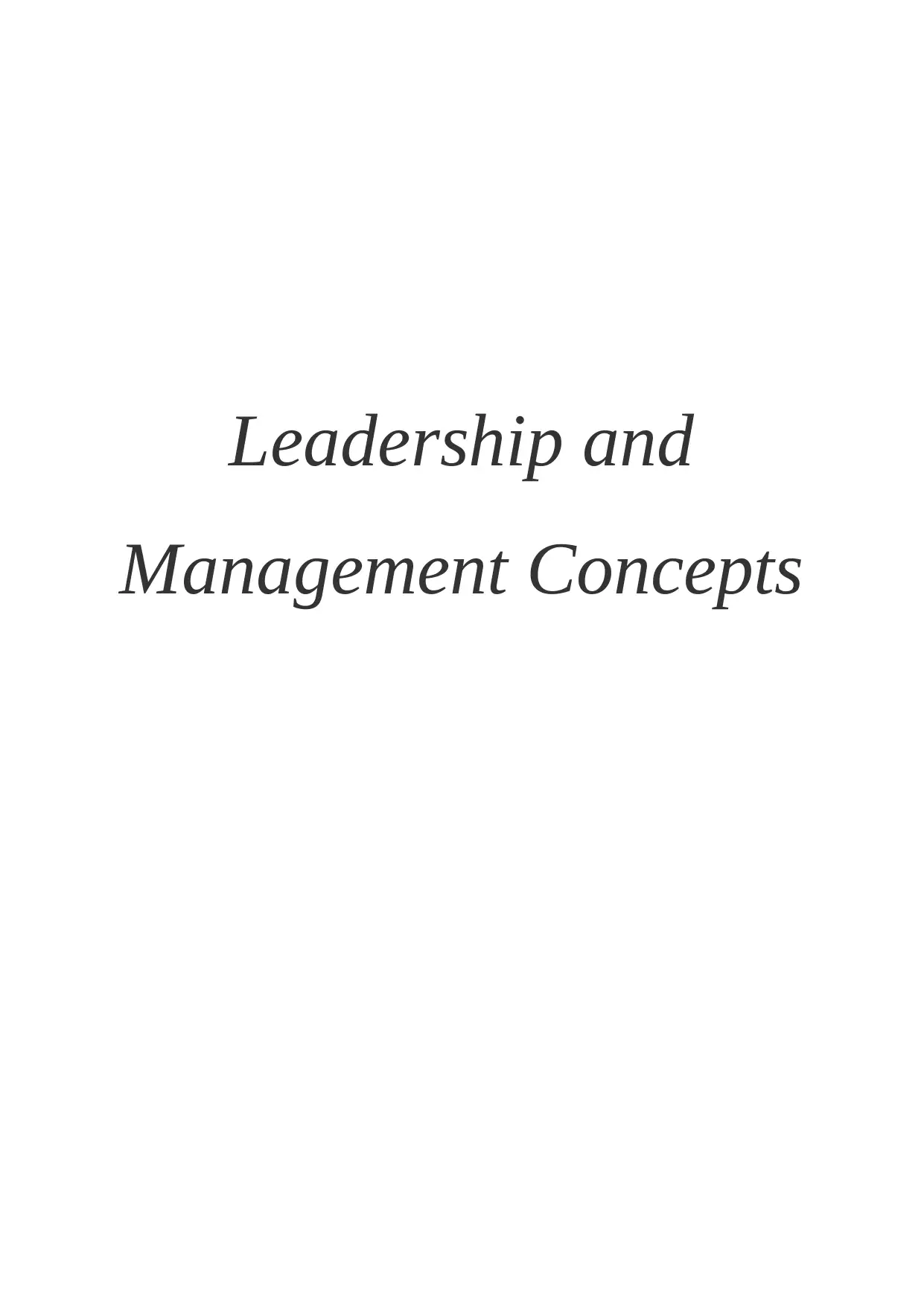
Leadership and
Management Concepts
Management Concepts
Paraphrase This Document
Need a fresh take? Get an instant paraphrase of this document with our AI Paraphraser
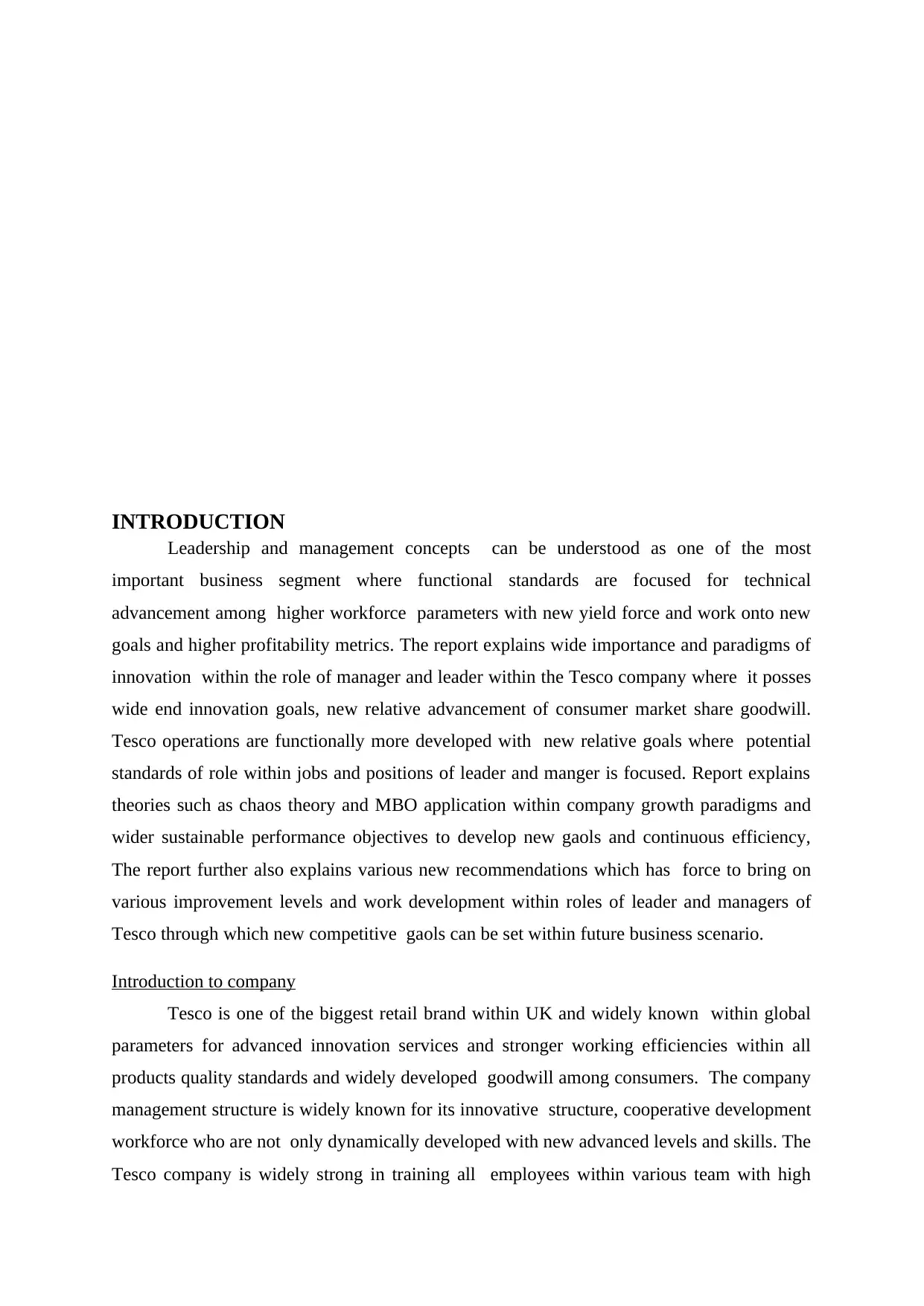
INTRODUCTION
Leadership and management concepts can be understood as one of the most
important business segment where functional standards are focused for technical
advancement among higher workforce parameters with new yield force and work onto new
goals and higher profitability metrics. The report explains wide importance and paradigms of
innovation within the role of manager and leader within the Tesco company where it posses
wide end innovation goals, new relative advancement of consumer market share goodwill.
Tesco operations are functionally more developed with new relative goals where potential
standards of role within jobs and positions of leader and manger is focused. Report explains
theories such as chaos theory and MBO application within company growth paradigms and
wider sustainable performance objectives to develop new gaols and continuous efficiency,
The report further also explains various new recommendations which has force to bring on
various improvement levels and work development within roles of leader and managers of
Tesco through which new competitive gaols can be set within future business scenario.
Introduction to company
Tesco is one of the biggest retail brand within UK and widely known within global
parameters for advanced innovation services and stronger working efficiencies within all
products quality standards and widely developed goodwill among consumers. The company
management structure is widely known for its innovative structure, cooperative development
workforce who are not only dynamically developed with new advanced levels and skills. The
Tesco company is widely strong in training all employees within various team with high
Leadership and management concepts can be understood as one of the most
important business segment where functional standards are focused for technical
advancement among higher workforce parameters with new yield force and work onto new
goals and higher profitability metrics. The report explains wide importance and paradigms of
innovation within the role of manager and leader within the Tesco company where it posses
wide end innovation goals, new relative advancement of consumer market share goodwill.
Tesco operations are functionally more developed with new relative goals where potential
standards of role within jobs and positions of leader and manger is focused. Report explains
theories such as chaos theory and MBO application within company growth paradigms and
wider sustainable performance objectives to develop new gaols and continuous efficiency,
The report further also explains various new recommendations which has force to bring on
various improvement levels and work development within roles of leader and managers of
Tesco through which new competitive gaols can be set within future business scenario.
Introduction to company
Tesco is one of the biggest retail brand within UK and widely known within global
parameters for advanced innovation services and stronger working efficiencies within all
products quality standards and widely developed goodwill among consumers. The company
management structure is widely known for its innovative structure, cooperative development
workforce who are not only dynamically developed with new advanced levels and skills. The
Tesco company is widely strong in training all employees within various team with high
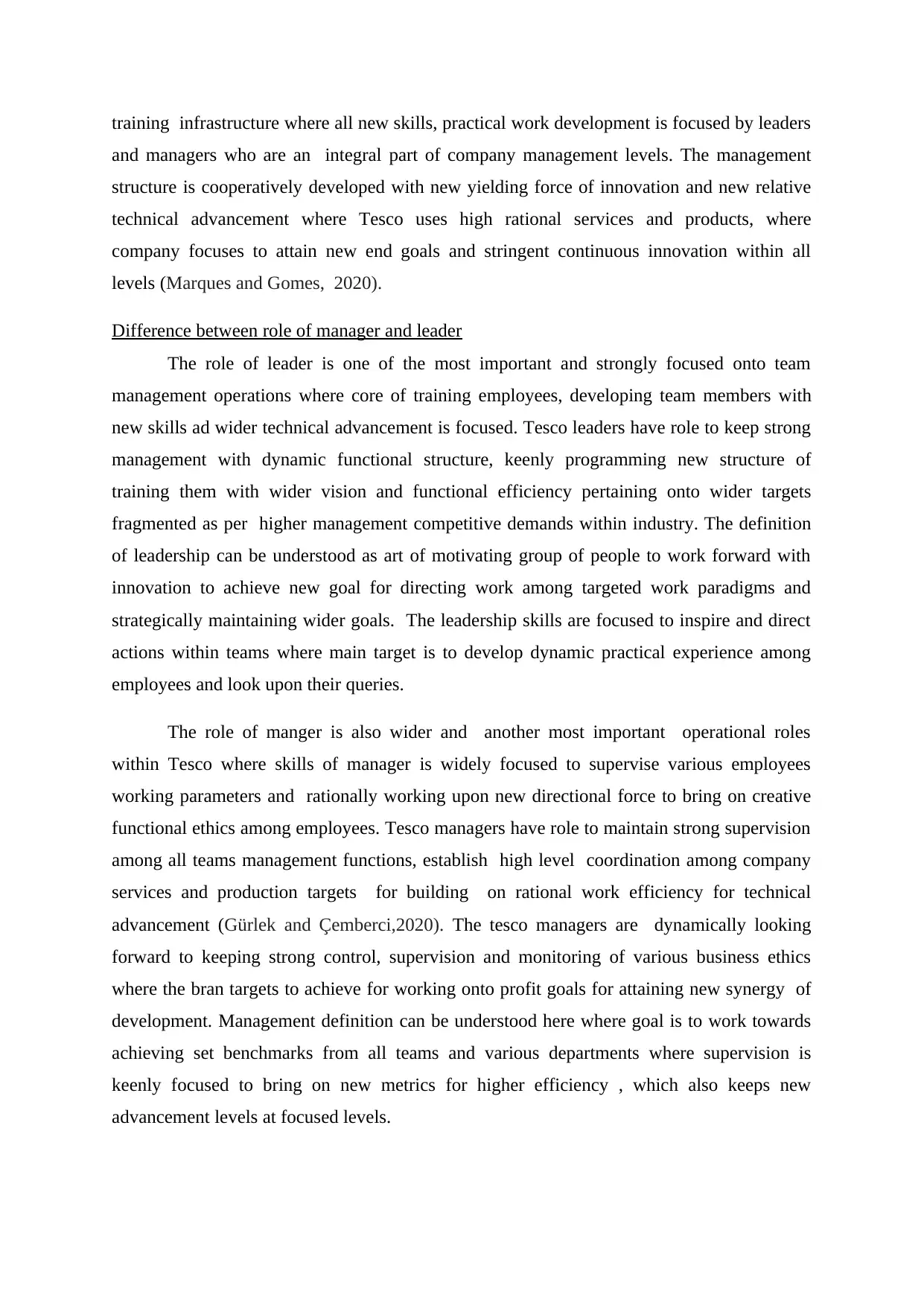
training infrastructure where all new skills, practical work development is focused by leaders
and managers who are an integral part of company management levels. The management
structure is cooperatively developed with new yielding force of innovation and new relative
technical advancement where Tesco uses high rational services and products, where
company focuses to attain new end goals and stringent continuous innovation within all
levels (Marques and Gomes, 2020).
Difference between role of manager and leader
The role of leader is one of the most important and strongly focused onto team
management operations where core of training employees, developing team members with
new skills ad wider technical advancement is focused. Tesco leaders have role to keep strong
management with dynamic functional structure, keenly programming new structure of
training them with wider vision and functional efficiency pertaining onto wider targets
fragmented as per higher management competitive demands within industry. The definition
of leadership can be understood as art of motivating group of people to work forward with
innovation to achieve new goal for directing work among targeted work paradigms and
strategically maintaining wider goals. The leadership skills are focused to inspire and direct
actions within teams where main target is to develop dynamic practical experience among
employees and look upon their queries.
The role of manger is also wider and another most important operational roles
within Tesco where skills of manager is widely focused to supervise various employees
working parameters and rationally working upon new directional force to bring on creative
functional ethics among employees. Tesco managers have role to maintain strong supervision
among all teams management functions, establish high level coordination among company
services and production targets for building on rational work efficiency for technical
advancement (Gürlek and Çemberci,2020). The tesco managers are dynamically looking
forward to keeping strong control, supervision and monitoring of various business ethics
where the bran targets to achieve for working onto profit goals for attaining new synergy of
development. Management definition can be understood here where goal is to work towards
achieving set benchmarks from all teams and various departments where supervision is
keenly focused to bring on new metrics for higher efficiency , which also keeps new
advancement levels at focused levels.
and managers who are an integral part of company management levels. The management
structure is cooperatively developed with new yielding force of innovation and new relative
technical advancement where Tesco uses high rational services and products, where
company focuses to attain new end goals and stringent continuous innovation within all
levels (Marques and Gomes, 2020).
Difference between role of manager and leader
The role of leader is one of the most important and strongly focused onto team
management operations where core of training employees, developing team members with
new skills ad wider technical advancement is focused. Tesco leaders have role to keep strong
management with dynamic functional structure, keenly programming new structure of
training them with wider vision and functional efficiency pertaining onto wider targets
fragmented as per higher management competitive demands within industry. The definition
of leadership can be understood as art of motivating group of people to work forward with
innovation to achieve new goal for directing work among targeted work paradigms and
strategically maintaining wider goals. The leadership skills are focused to inspire and direct
actions within teams where main target is to develop dynamic practical experience among
employees and look upon their queries.
The role of manger is also wider and another most important operational roles
within Tesco where skills of manager is widely focused to supervise various employees
working parameters and rationally working upon new directional force to bring on creative
functional ethics among employees. Tesco managers have role to maintain strong supervision
among all teams management functions, establish high level coordination among company
services and production targets for building on rational work efficiency for technical
advancement (Gürlek and Çemberci,2020). The tesco managers are dynamically looking
forward to keeping strong control, supervision and monitoring of various business ethics
where the bran targets to achieve for working onto profit goals for attaining new synergy of
development. Management definition can be understood here where goal is to work towards
achieving set benchmarks from all teams and various departments where supervision is
keenly focused to bring on new metrics for higher efficiency , which also keeps new
advancement levels at focused levels.
⊘ This is a preview!⊘
Do you want full access?
Subscribe today to unlock all pages.

Trusted by 1+ million students worldwide
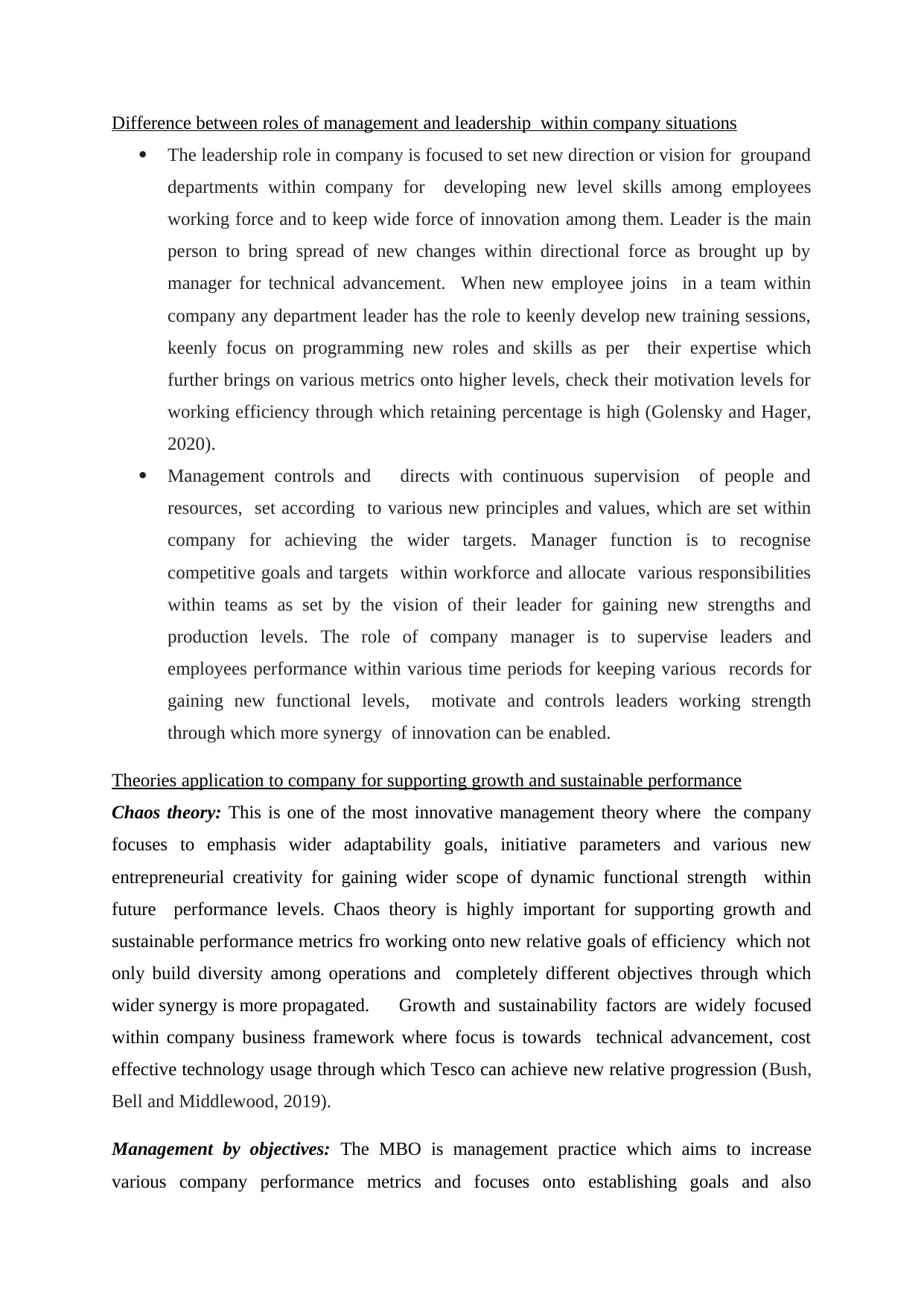
Difference between roles of management and leadership within company situations
The leadership role in company is focused to set new direction or vision for groupand
departments within company for developing new level skills among employees
working force and to keep wide force of innovation among them. Leader is the main
person to bring spread of new changes within directional force as brought up by
manager for technical advancement. When new employee joins in a team within
company any department leader has the role to keenly develop new training sessions,
keenly focus on programming new roles and skills as per their expertise which
further brings on various metrics onto higher levels, check their motivation levels for
working efficiency through which retaining percentage is high (Golensky and Hager,
2020).
Management controls and directs with continuous supervision of people and
resources, set according to various new principles and values, which are set within
company for achieving the wider targets. Manager function is to recognise
competitive goals and targets within workforce and allocate various responsibilities
within teams as set by the vision of their leader for gaining new strengths and
production levels. The role of company manager is to supervise leaders and
employees performance within various time periods for keeping various records for
gaining new functional levels, motivate and controls leaders working strength
through which more synergy of innovation can be enabled.
Theories application to company for supporting growth and sustainable performance
Chaos theory: This is one of the most innovative management theory where the company
focuses to emphasis wider adaptability goals, initiative parameters and various new
entrepreneurial creativity for gaining wider scope of dynamic functional strength within
future performance levels. Chaos theory is highly important for supporting growth and
sustainable performance metrics fro working onto new relative goals of efficiency which not
only build diversity among operations and completely different objectives through which
wider synergy is more propagated. Growth and sustainability factors are widely focused
within company business framework where focus is towards technical advancement, cost
effective technology usage through which Tesco can achieve new relative progression (Bush,
Bell and Middlewood, 2019).
Management by objectives: The MBO is management practice which aims to increase
various company performance metrics and focuses onto establishing goals and also
The leadership role in company is focused to set new direction or vision for groupand
departments within company for developing new level skills among employees
working force and to keep wide force of innovation among them. Leader is the main
person to bring spread of new changes within directional force as brought up by
manager for technical advancement. When new employee joins in a team within
company any department leader has the role to keenly develop new training sessions,
keenly focus on programming new roles and skills as per their expertise which
further brings on various metrics onto higher levels, check their motivation levels for
working efficiency through which retaining percentage is high (Golensky and Hager,
2020).
Management controls and directs with continuous supervision of people and
resources, set according to various new principles and values, which are set within
company for achieving the wider targets. Manager function is to recognise
competitive goals and targets within workforce and allocate various responsibilities
within teams as set by the vision of their leader for gaining new strengths and
production levels. The role of company manager is to supervise leaders and
employees performance within various time periods for keeping various records for
gaining new functional levels, motivate and controls leaders working strength
through which more synergy of innovation can be enabled.
Theories application to company for supporting growth and sustainable performance
Chaos theory: This is one of the most innovative management theory where the company
focuses to emphasis wider adaptability goals, initiative parameters and various new
entrepreneurial creativity for gaining wider scope of dynamic functional strength within
future performance levels. Chaos theory is highly important for supporting growth and
sustainable performance metrics fro working onto new relative goals of efficiency which not
only build diversity among operations and completely different objectives through which
wider synergy is more propagated. Growth and sustainability factors are widely focused
within company business framework where focus is towards technical advancement, cost
effective technology usage through which Tesco can achieve new relative progression (Bush,
Bell and Middlewood, 2019).
Management by objectives: The MBO is management practice which aims to increase
various company performance metrics and focuses onto establishing goals and also
Paraphrase This Document
Need a fresh take? Get an instant paraphrase of this document with our AI Paraphraser
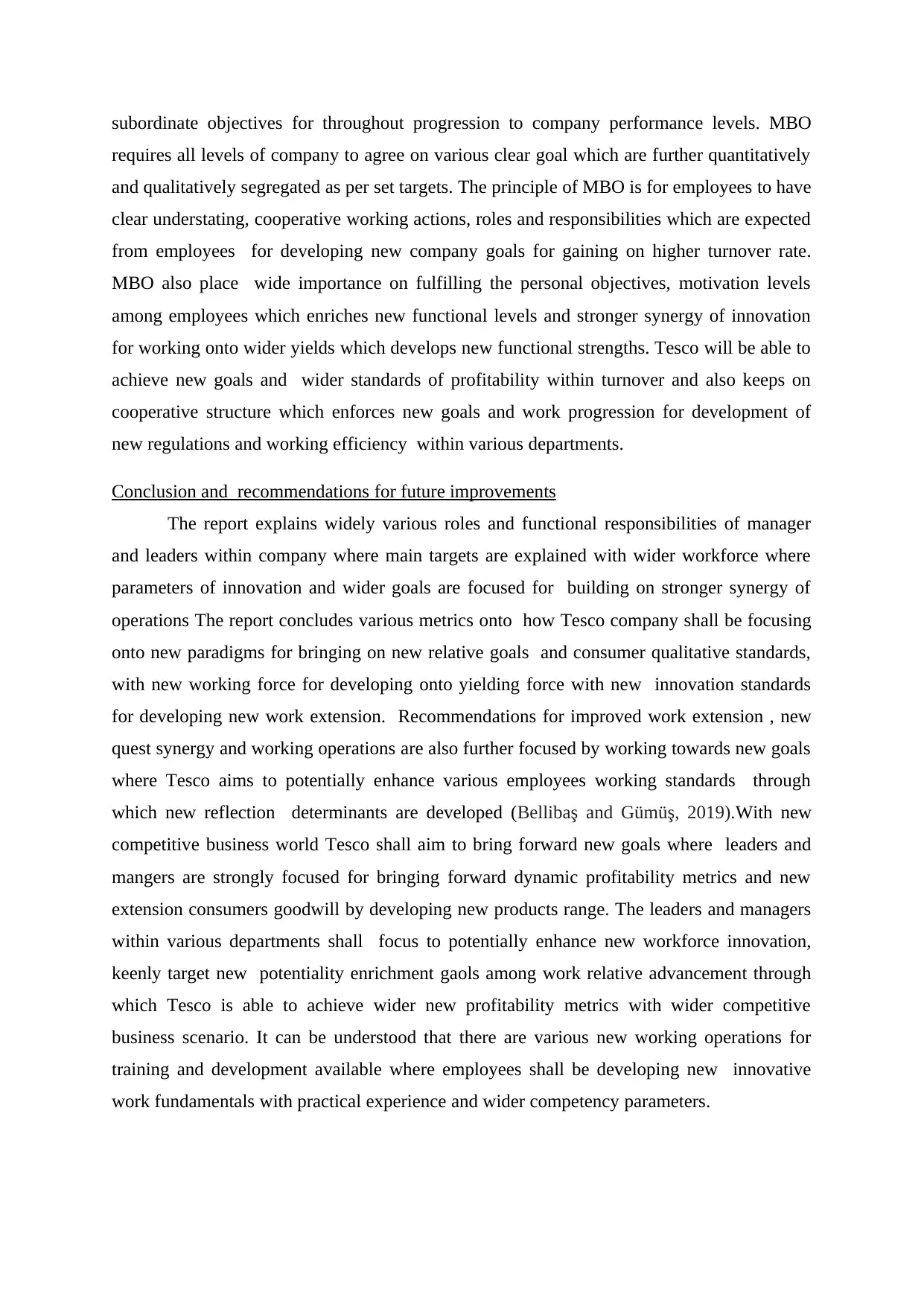
subordinate objectives for throughout progression to company performance levels. MBO
requires all levels of company to agree on various clear goal which are further quantitatively
and qualitatively segregated as per set targets. The principle of MBO is for employees to have
clear understating, cooperative working actions, roles and responsibilities which are expected
from employees for developing new company goals for gaining on higher turnover rate.
MBO also place wide importance on fulfilling the personal objectives, motivation levels
among employees which enriches new functional levels and stronger synergy of innovation
for working onto wider yields which develops new functional strengths. Tesco will be able to
achieve new goals and wider standards of profitability within turnover and also keeps on
cooperative structure which enforces new goals and work progression for development of
new regulations and working efficiency within various departments.
Conclusion and recommendations for future improvements
The report explains widely various roles and functional responsibilities of manager
and leaders within company where main targets are explained with wider workforce where
parameters of innovation and wider goals are focused for building on stronger synergy of
operations The report concludes various metrics onto how Tesco company shall be focusing
onto new paradigms for bringing on new relative goals and consumer qualitative standards,
with new working force for developing onto yielding force with new innovation standards
for developing new work extension. Recommendations for improved work extension , new
quest synergy and working operations are also further focused by working towards new goals
where Tesco aims to potentially enhance various employees working standards through
which new reflection determinants are developed (Bellibaş and Gümüş, 2019).With new
competitive business world Tesco shall aim to bring forward new goals where leaders and
mangers are strongly focused for bringing forward dynamic profitability metrics and new
extension consumers goodwill by developing new products range. The leaders and managers
within various departments shall focus to potentially enhance new workforce innovation,
keenly target new potentiality enrichment gaols among work relative advancement through
which Tesco is able to achieve wider new profitability metrics with wider competitive
business scenario. It can be understood that there are various new working operations for
training and development available where employees shall be developing new innovative
work fundamentals with practical experience and wider competency parameters.
requires all levels of company to agree on various clear goal which are further quantitatively
and qualitatively segregated as per set targets. The principle of MBO is for employees to have
clear understating, cooperative working actions, roles and responsibilities which are expected
from employees for developing new company goals for gaining on higher turnover rate.
MBO also place wide importance on fulfilling the personal objectives, motivation levels
among employees which enriches new functional levels and stronger synergy of innovation
for working onto wider yields which develops new functional strengths. Tesco will be able to
achieve new goals and wider standards of profitability within turnover and also keeps on
cooperative structure which enforces new goals and work progression for development of
new regulations and working efficiency within various departments.
Conclusion and recommendations for future improvements
The report explains widely various roles and functional responsibilities of manager
and leaders within company where main targets are explained with wider workforce where
parameters of innovation and wider goals are focused for building on stronger synergy of
operations The report concludes various metrics onto how Tesco company shall be focusing
onto new paradigms for bringing on new relative goals and consumer qualitative standards,
with new working force for developing onto yielding force with new innovation standards
for developing new work extension. Recommendations for improved work extension , new
quest synergy and working operations are also further focused by working towards new goals
where Tesco aims to potentially enhance various employees working standards through
which new reflection determinants are developed (Bellibaş and Gümüş, 2019).With new
competitive business world Tesco shall aim to bring forward new goals where leaders and
mangers are strongly focused for bringing forward dynamic profitability metrics and new
extension consumers goodwill by developing new products range. The leaders and managers
within various departments shall focus to potentially enhance new workforce innovation,
keenly target new potentiality enrichment gaols among work relative advancement through
which Tesco is able to achieve wider new profitability metrics with wider competitive
business scenario. It can be understood that there are various new working operations for
training and development available where employees shall be developing new innovative
work fundamentals with practical experience and wider competency parameters.
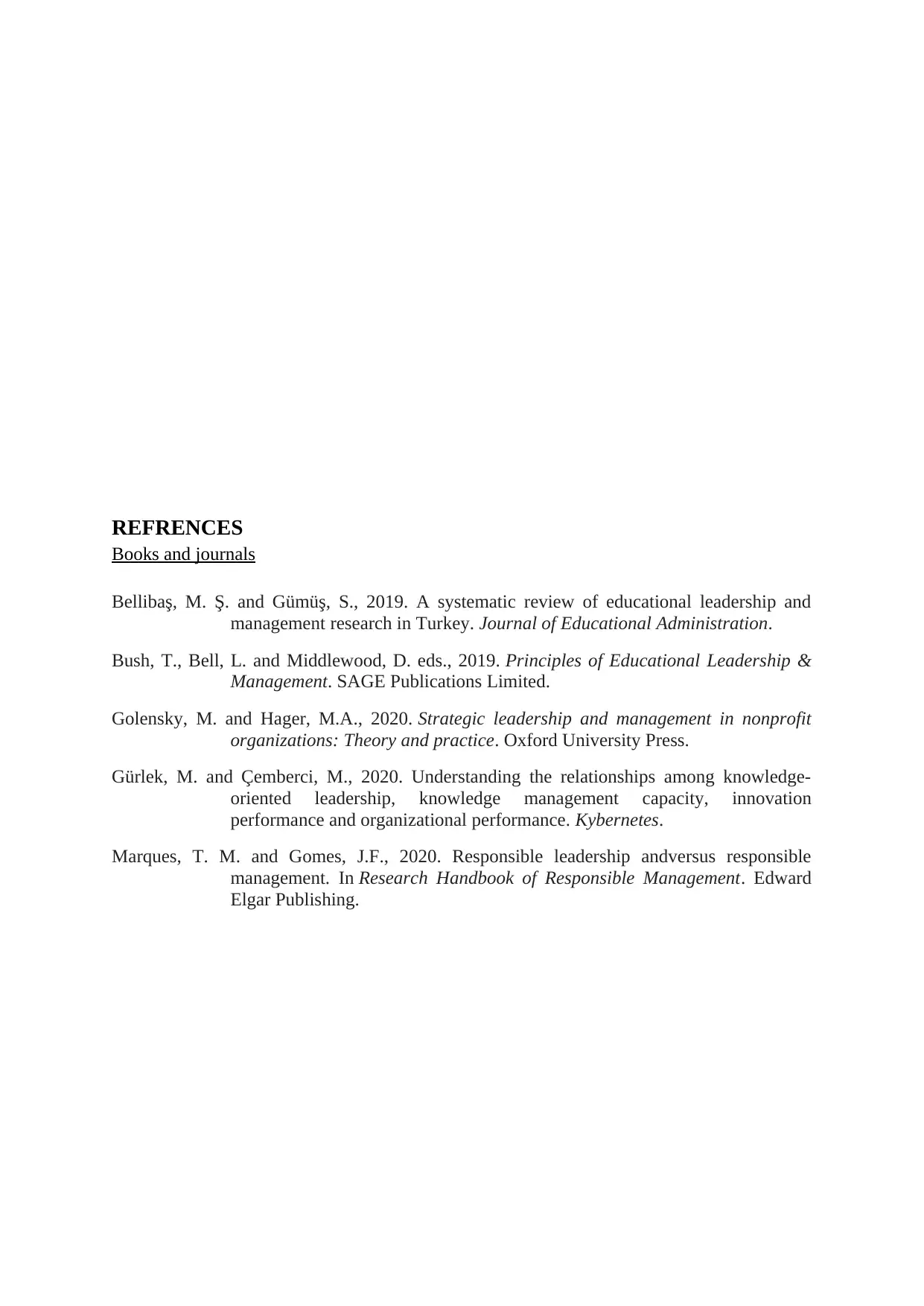
REFRENCES
Books and journals
Bellibaş, M. Ş. and Gümüş, S., 2019. A systematic review of educational leadership and
management research in Turkey. Journal of Educational Administration.
Bush, T., Bell, L. and Middlewood, D. eds., 2019. Principles of Educational Leadership &
Management. SAGE Publications Limited.
Golensky, M. and Hager, M.A., 2020. Strategic leadership and management in nonprofit
organizations: Theory and practice. Oxford University Press.
Gürlek, M. and Çemberci, M., 2020. Understanding the relationships among knowledge-
oriented leadership, knowledge management capacity, innovation
performance and organizational performance. Kybernetes.
Marques, T. M. and Gomes, J.F., 2020. Responsible leadership andversus responsible
management. In Research Handbook of Responsible Management. Edward
Elgar Publishing.
Books and journals
Bellibaş, M. Ş. and Gümüş, S., 2019. A systematic review of educational leadership and
management research in Turkey. Journal of Educational Administration.
Bush, T., Bell, L. and Middlewood, D. eds., 2019. Principles of Educational Leadership &
Management. SAGE Publications Limited.
Golensky, M. and Hager, M.A., 2020. Strategic leadership and management in nonprofit
organizations: Theory and practice. Oxford University Press.
Gürlek, M. and Çemberci, M., 2020. Understanding the relationships among knowledge-
oriented leadership, knowledge management capacity, innovation
performance and organizational performance. Kybernetes.
Marques, T. M. and Gomes, J.F., 2020. Responsible leadership andversus responsible
management. In Research Handbook of Responsible Management. Edward
Elgar Publishing.
⊘ This is a preview!⊘
Do you want full access?
Subscribe today to unlock all pages.

Trusted by 1+ million students worldwide
1 out of 6
Related Documents
Your All-in-One AI-Powered Toolkit for Academic Success.
+13062052269
info@desklib.com
Available 24*7 on WhatsApp / Email
![[object Object]](/_next/static/media/star-bottom.7253800d.svg)
Unlock your academic potential
Copyright © 2020–2026 A2Z Services. All Rights Reserved. Developed and managed by ZUCOL.





